Post-translational modulation of cell signalling through protein succinylation
Cells need to adapt their activities to extra- and intracellular signalling cues. To translate a received extracellular signal, cells have specific receptors that transmit the signal to downstream p
[...] Read more.
Cells need to adapt their activities to extra- and intracellular signalling cues. To translate a received extracellular signal, cells have specific receptors that transmit the signal to downstream proteins so that it can reach the nucleus to initiate or repress gene transcription. Post-translational modifications (PTMs) of proteins are reversible or irreversible chemical modifications that help to further modulate protein activity. The most commonly observed PTMs are the phosphorylation of serine, threonine, and tyrosine residues, followed by acetylation, glycosylation, and amidation. In addition to PTMs that involve the modification of a certain amino acid (phosphorylation, hydrophobic groups for membrane localisation, or chemical groups like acylation), or the conjugation of peptides (SUMOylation, NEDDylation), structural changes such as the formation of disulphide bridge, protein cleavage or splicing can also be classified as PTMs. Recently, it was discovered that metabolites from the tricarboxylic acid (TCA) cycle are not only intermediates that support cellular metabolism but can also modify lysine residues. This has been shown for acetate, succinate, and lactate, among others. Due to the importance of mitochondria for the overall fitness of organisms, the regulatory function of such PTMs is critical for protection from aging, neurodegeneration, or cardiovascular disease. Cancer cells and activated immune cells display a phenotype of accelerated metabolic activity known as the Warburg effect. This metabolic state is characterised by enhanced glycolysis, the use of the pentose phosphate pathway as well as a disruption of the TCA cycle, ultimately causing the accumulation of metabolites like citrate, succinate, and malate. Succinate can then serve as a signalling molecule by directly interacting with proteins, by binding to its G protein-coupled receptor 91 (GPR91) and by post-translationally modifying proteins through succinylation of lysine residues, respectively. This review is focus on the process of protein succinylation and its importance in health and disease.
Katharina F. Kubatzky ... Dayoung Yu
Cells need to adapt their activities to extra- and intracellular signalling cues. To translate a received extracellular signal, cells have specific receptors that transmit the signal to downstream proteins so that it can reach the nucleus to initiate or repress gene transcription. Post-translational modifications (PTMs) of proteins are reversible or irreversible chemical modifications that help to further modulate protein activity. The most commonly observed PTMs are the phosphorylation of serine, threonine, and tyrosine residues, followed by acetylation, glycosylation, and amidation. In addition to PTMs that involve the modification of a certain amino acid (phosphorylation, hydrophobic groups for membrane localisation, or chemical groups like acylation), or the conjugation of peptides (SUMOylation, NEDDylation), structural changes such as the formation of disulphide bridge, protein cleavage or splicing can also be classified as PTMs. Recently, it was discovered that metabolites from the tricarboxylic acid (TCA) cycle are not only intermediates that support cellular metabolism but can also modify lysine residues. This has been shown for acetate, succinate, and lactate, among others. Due to the importance of mitochondria for the overall fitness of organisms, the regulatory function of such PTMs is critical for protection from aging, neurodegeneration, or cardiovascular disease. Cancer cells and activated immune cells display a phenotype of accelerated metabolic activity known as the Warburg effect. This metabolic state is characterised by enhanced glycolysis, the use of the pentose phosphate pathway as well as a disruption of the TCA cycle, ultimately causing the accumulation of metabolites like citrate, succinate, and malate. Succinate can then serve as a signalling molecule by directly interacting with proteins, by binding to its G protein-coupled receptor 91 (GPR91) and by post-translationally modifying proteins through succinylation of lysine residues, respectively. This review is focus on the process of protein succinylation and its importance in health and disease.
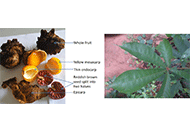 Cola rostrata K. Schum. constituents induce cytotoxicity through reactive oxygen species generation and mitochondrial membrane depolarisationOpen AccessOriginal ArticleAim: While the traditional use of Cola rostrata in treating illnesses and diseases has not been reported, the presence of cytotoxic principles has been reported in phylogenetically and biogeograp [...] Read more.Babatunde E. Ajayi ... Amos A. FatokunPublished: December 28, 2023 Explor Target Antitumor Ther. 2023;4:1328–1344
Cola rostrata K. Schum. constituents induce cytotoxicity through reactive oxygen species generation and mitochondrial membrane depolarisationOpen AccessOriginal ArticleAim: While the traditional use of Cola rostrata in treating illnesses and diseases has not been reported, the presence of cytotoxic principles has been reported in phylogenetically and biogeograp [...] Read more.Babatunde E. Ajayi ... Amos A. FatokunPublished: December 28, 2023 Explor Target Antitumor Ther. 2023;4:1328–1344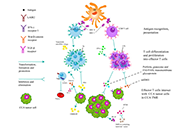 Therapeutic significance of tumor microenvironment in cholangiocarcinoma: focus on tumor-infiltrating T lymphocytesOpen AccessReviewCholangiocarcinoma (CCA) is a highly aggressive type of adenocarcinoma distinguished by its invasiveness. Depending on specific anatomical positioning within the biliary tree, CCA can be categorized [...] Read more.Chaoqun Li ... Jieer YingPublished: December 28, 2023 Explor Target Antitumor Ther 2023;4:1310–1327
Therapeutic significance of tumor microenvironment in cholangiocarcinoma: focus on tumor-infiltrating T lymphocytesOpen AccessReviewCholangiocarcinoma (CCA) is a highly aggressive type of adenocarcinoma distinguished by its invasiveness. Depending on specific anatomical positioning within the biliary tree, CCA can be categorized [...] Read more.Chaoqun Li ... Jieer YingPublished: December 28, 2023 Explor Target Antitumor Ther 2023;4:1310–1327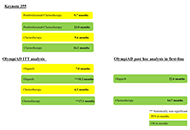 Facing the conundrum: which first-line therapy should be used for patients with metastatic triple-negative breast cancer carrying germline BRCA mutation?Open AccessPerspectivePembrolizumab combined with chemotherapy has been established as the preferred first-line therapy for treating metastatic triple-negative breast cancer (mTNBC) with programmed cell death ligand-1 (P [...] Read more.Sabah Alaklabi ... Shipra GandhiPublished: December 27, 2023 Explor Target Antitumor Ther. 2023;4:1301–1309
Facing the conundrum: which first-line therapy should be used for patients with metastatic triple-negative breast cancer carrying germline BRCA mutation?Open AccessPerspectivePembrolizumab combined with chemotherapy has been established as the preferred first-line therapy for treating metastatic triple-negative breast cancer (mTNBC) with programmed cell death ligand-1 (P [...] Read more.Sabah Alaklabi ... Shipra GandhiPublished: December 27, 2023 Explor Target Antitumor Ther. 2023;4:1301–1309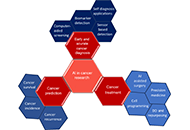 Current implications and challenges of artificial intelligence technologies in therapeutic intervention of colorectal cancerOpen AccessReviewIrrespective of men and women, colorectal cancer (CRC), is the third most common cancer in the population with more than 1.85 million cases annually. Fewer than 20% of patients only survive beyond f [...] Read more.Kriti Das ... Chakresh Kumar JainPublished: December 27, 2023 Explor Target Antitumor Ther. 2023;4:1286–1300
Current implications and challenges of artificial intelligence technologies in therapeutic intervention of colorectal cancerOpen AccessReviewIrrespective of men and women, colorectal cancer (CRC), is the third most common cancer in the population with more than 1.85 million cases annually. Fewer than 20% of patients only survive beyond f [...] Read more.Kriti Das ... Chakresh Kumar JainPublished: December 27, 2023 Explor Target Antitumor Ther. 2023;4:1286–1300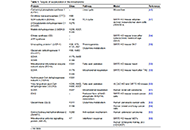 Post-translational modulation of cell signalling through protein succinylationOpen AccessReviewCells need to adapt their activities to extra- and intracellular signalling cues. To translate a received extracellular signal, cells have specific receptors that transmit the signal to downstream p [...] Read more.Katharina F. Kubatzky ... Dayoung YuPublished: December 27, 2023 Explor Target Antitumor Ther. 2023;4:1260–1285
Post-translational modulation of cell signalling through protein succinylationOpen AccessReviewCells need to adapt their activities to extra- and intracellular signalling cues. To translate a received extracellular signal, cells have specific receptors that transmit the signal to downstream p [...] Read more.Katharina F. Kubatzky ... Dayoung YuPublished: December 27, 2023 Explor Target Antitumor Ther. 2023;4:1260–1285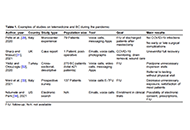 Telehealth in breast cancer following the coronavirus disease 2019 pandemicOpen AccessReviewBreast cancer (BC) is the second most diagnosed cancer in 2018 with around 2.3 million cases globally in 2020. In March 2020 and after its worldwide spread, the World Health Organization (WHO) decla [...] Read more.Jean Zeghondy ... Barbara PistilliPublished: December 26, 2023 Explor Target Antitumor Ther. 2023;4:1249–1259
Telehealth in breast cancer following the coronavirus disease 2019 pandemicOpen AccessReviewBreast cancer (BC) is the second most diagnosed cancer in 2018 with around 2.3 million cases globally in 2020. In March 2020 and after its worldwide spread, the World Health Organization (WHO) decla [...] Read more.Jean Zeghondy ... Barbara PistilliPublished: December 26, 2023 Explor Target Antitumor Ther. 2023;4:1249–1259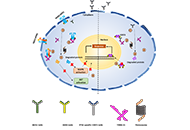 Recent advancements in targeted protein knockdown technologies—emerging paradigms for targeted therapyOpen AccessReviewA generalized therapeutic strategy for various disease conditions, including cancer, is to deplete or inactivate harmful protein targets. Various forms of protein or gene silencing molecules, e.g., [...] Read more.Mansi Joshi ... Abhijit DePublished: December 26, 2023 Explor Target Antitumor Ther. 2023;4:1227–1248
Recent advancements in targeted protein knockdown technologies—emerging paradigms for targeted therapyOpen AccessReviewA generalized therapeutic strategy for various disease conditions, including cancer, is to deplete or inactivate harmful protein targets. Various forms of protein or gene silencing molecules, e.g., [...] Read more.Mansi Joshi ... Abhijit DePublished: December 26, 2023 Explor Target Antitumor Ther. 2023;4:1227–1248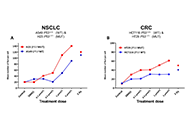 Investigations of the novel checkpoint kinase 1 inhibitor SRA737 in non-small cell lung cancer and colorectal cancer cells of differing tumour protein 53 gene statusOpen AccessOriginal ArticleAim: In response to DNA damage the serine/threonine-specific protein kinase checkpoint kinase 1 (CHK1) is activated allowing cells to enter S phase (S) and G2 phase (G2) cell-cycle arrest. CHK1 i [...] Read more.Ali JN Duabil ... George DD JonesPublished: December 21, 2023 Explor Target Antitumor Ther. 2023;4:1210–1226
Investigations of the novel checkpoint kinase 1 inhibitor SRA737 in non-small cell lung cancer and colorectal cancer cells of differing tumour protein 53 gene statusOpen AccessOriginal ArticleAim: In response to DNA damage the serine/threonine-specific protein kinase checkpoint kinase 1 (CHK1) is activated allowing cells to enter S phase (S) and G2 phase (G2) cell-cycle arrest. CHK1 i [...] Read more.Ali JN Duabil ... George DD JonesPublished: December 21, 2023 Explor Target Antitumor Ther. 2023;4:1210–1226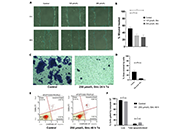 Receptor tyrosine kinase-like orphan receptor 1 inhibitor strictinin exhibits anti-cancer properties against highly aggressive androgen-independent prostate cancerOpen AccessOriginal ArticleAim: It is important to identify anti-cancer compounds that can inhibit specific molecular targets to eradicate androgen-receptor negative (ARneg), androgen-independent (AI) prostate cancer, whic [...] Read more.Vignesh Sivaganesh, Bela PeethambaranPublished: December 20, 2023 Explor Target Antitumor Ther. 2023;4:1188–1209
Receptor tyrosine kinase-like orphan receptor 1 inhibitor strictinin exhibits anti-cancer properties against highly aggressive androgen-independent prostate cancerOpen AccessOriginal ArticleAim: It is important to identify anti-cancer compounds that can inhibit specific molecular targets to eradicate androgen-receptor negative (ARneg), androgen-independent (AI) prostate cancer, whic [...] Read more.Vignesh Sivaganesh, Bela PeethambaranPublished: December 20, 2023 Explor Target Antitumor Ther. 2023;4:1188–1209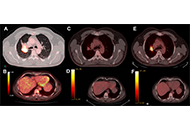 Is oligoprogression a potentially curable disease in epidermal growth factor receptor mutant lung adenocarcinoma?Open AccessCase ReportThird-generation epidermal growth factor receptor (EGFR)-tyrosine kinase inhibitors (TKIs) have shown impressive results in EGFR mutant lung cancer (LC) patients in terms of disease control rate wit [...] Read more.Sviatoslav Chekhun ... Maria SaigíPublished: December 13, 2023 Explor Target Antitumor Ther. 2023;4:1182–1187
Is oligoprogression a potentially curable disease in epidermal growth factor receptor mutant lung adenocarcinoma?Open AccessCase ReportThird-generation epidermal growth factor receptor (EGFR)-tyrosine kinase inhibitors (TKIs) have shown impressive results in EGFR mutant lung cancer (LC) patients in terms of disease control rate wit [...] Read more.Sviatoslav Chekhun ... Maria SaigíPublished: December 13, 2023 Explor Target Antitumor Ther. 2023;4:1182–1187